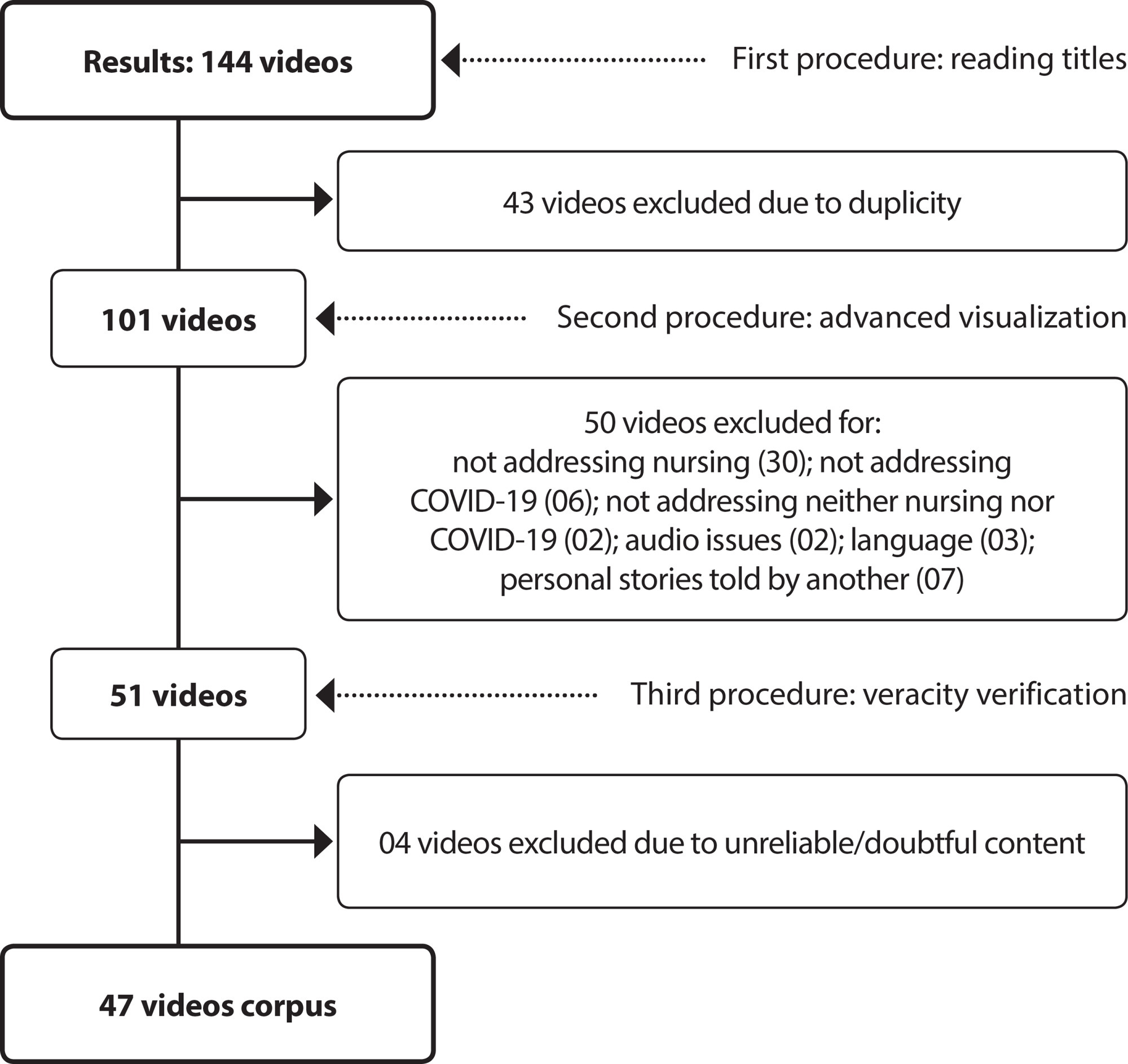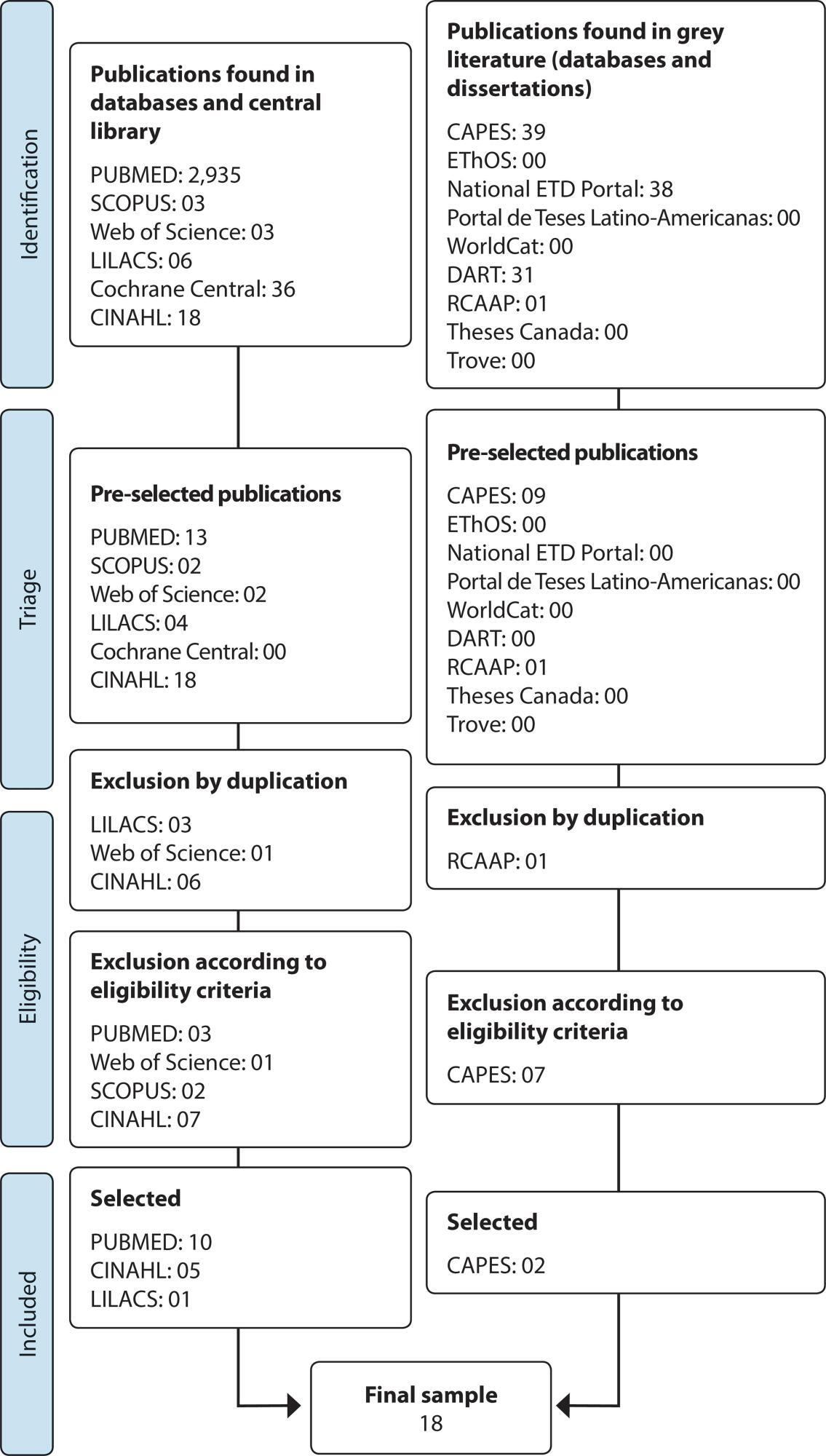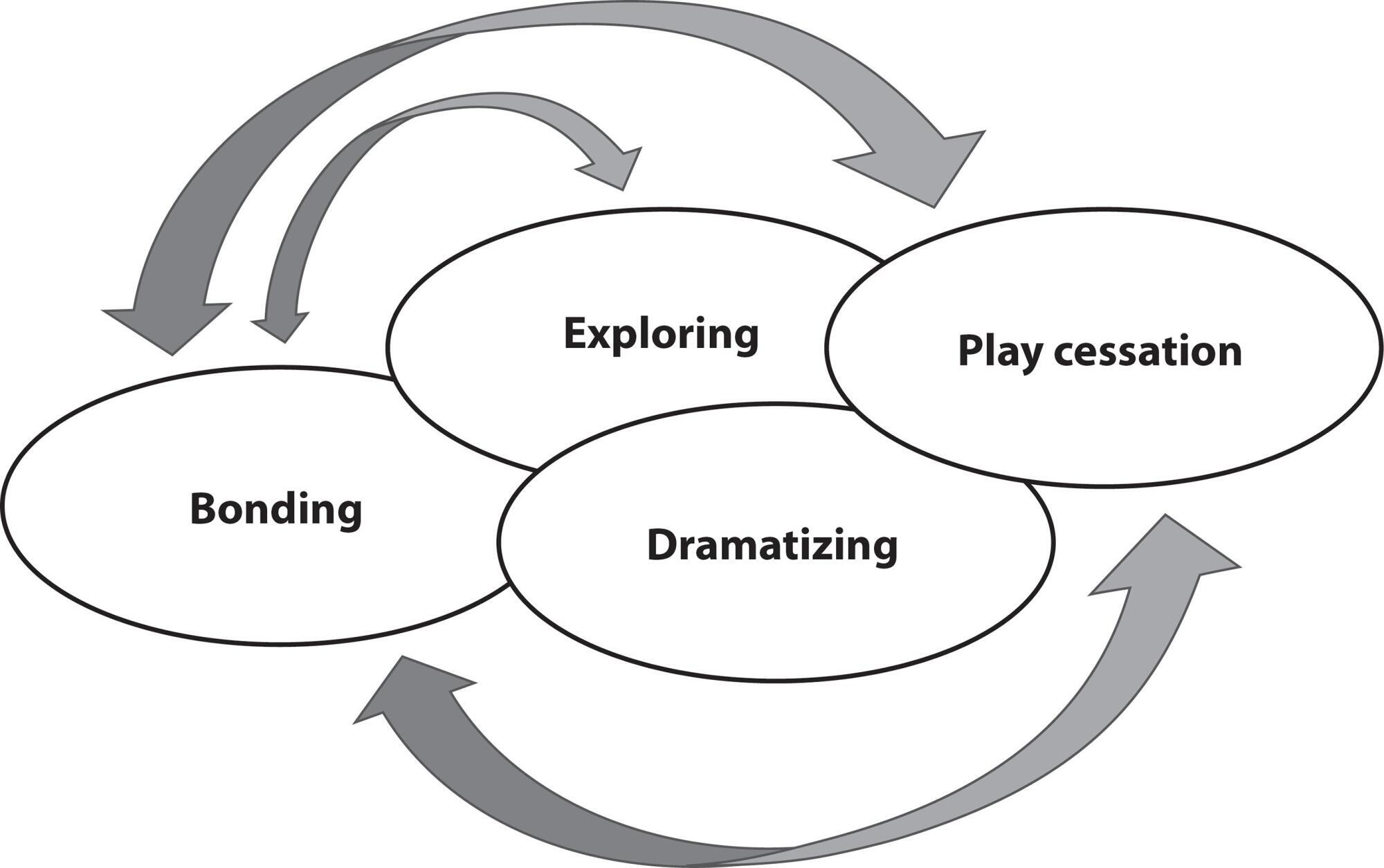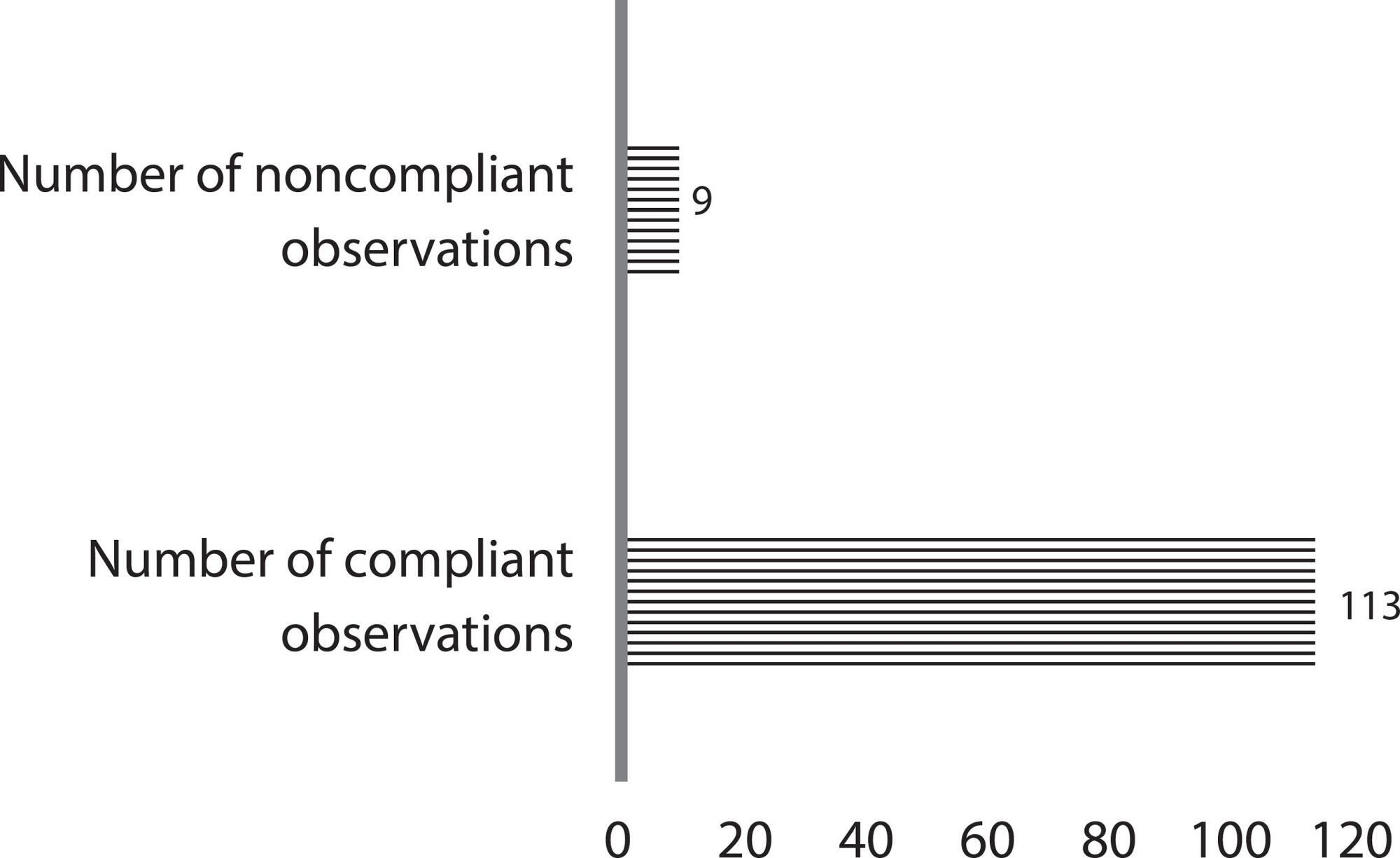-
RESEARCH01-01-2017
Validation of an instrument regarding nursing intervention in patients in vasoactive therapy
Revista Brasileira de Enfermagem. 2017;70(3):453-460
Abstract
RESEARCHValidation of an instrument regarding nursing intervention in patients in vasoactive therapy
Revista Brasileira de Enfermagem. 2017;70(3):453-460
DOI 10.1590/0034-7167-2016-0254
Views0See moreABSTRACT
Objective:
to validate the content of a Standard Operational Procedure, regarding nursing interventions in emergency patients treated with vasoactive drugs.
Method:
methodological study, carried out from December 2015 to January 2016. Content validity was determined by 16 experts (13 nurses, 2 pharmacists and one biomedical scientist), who judged it through a four-point Likert scale. The items were evaluated in terms of: feasibility, objectivity, simplicity, clearness, pertinence and accuracy. The Content Validity Index was applied, accepting the value ≥ 0.90.
Results:
two rounds of evaluation were required to achieve the minimum index. The items were reviewed regarding writing, dilution, indication and replacement interval. The instrument was validated with 33 items and with total Content Validity Index of 0.99.
Conclusion:
the instrument was considered appropriate, fractionally and globally, for nursing care for the patient treated with vasoactive drugs in emergency, in a safe and reliable way.
-
01-01-2017
Nursing in cardiology: state of the art and frontiers of knowledge
Revista Brasileira de Enfermagem. 2017;70(3):451-452
Abstract
Nursing in cardiology: state of the art and frontiers of knowledge
Revista Brasileira de Enfermagem. 2017;70(3):451-452
DOI 10.1590/0034-7167.2017700301
Views0Heart diseases lead the group of clinical disorders with higher rates of hospitalization and mortality and present a progressive increase in incidence due to population ageing, simultaneously to the development of new health therapies and technology. DATASUS() estimated a cost of nearly 700 million Reais for the country’s health care system in 2015, only for […]See more -
01-01-2017
Enfermagem em cardiologia: estado da arte e fronteiras do conhecimento
Revista Brasileira de Enfermagem. 2017;70(3):451-452
Abstract
Enfermagem em cardiologia: estado da arte e fronteiras do conhecimento
Revista Brasileira de Enfermagem. 2017;70(3):451-452
DOI 10.1590/0034-7167.2017700301
Views0As doenças cardíacas lideram o grupo das desordens clínicas de maiores taxas de hospitalização e mortalidade, além de apresentarem um progressivo aumento da incidência na população devido ao envelhecimento concomitante ao desenvolvimento das terapias e tecnologias em saúde. Uma estimativa obtida pelo DATASUS() acusa um gasto onerado ao sistema de saúde do país, no ano […]See more -
REFLECTION01-01-2017
Nursing care in early childhood: contributions from intersubjective recognition
Revista Brasileira de Enfermagem. 2017;70(2):446-450
Abstract
REFLECTIONNursing care in early childhood: contributions from intersubjective recognition
Revista Brasileira de Enfermagem. 2017;70(2):446-450
DOI 10.1590/0034-7167-2016-0319
Views0See moreABSTRACT
Objective:
to understand the elements composing intersubjective recognition that are relevant for nursing care in early childhood in favor of comprehensive child development.
Method:
reflexive study based on the Honnethian concept of intersubjective recognition in the dimensions of affection, defense of rights, and social esteem.
Results:
nursing knowledge and practices, permeated by the intersubjective recognition in the mentioned dimensions, contribute to the dynamism of interpersonal relations, the production of co-responsibility, and shared construction of health care in early childhood, with benefits to comprehensive development.
Conclusion:
a successful coordination of the three intersubjective dimensions enables the expansion of the understanding on childhood and nursing care in child health in the field of human development promotion, covering affection, defense of rights, and social esteem in the established relationships with future positive individual and social possibilities.
-
REFLECTION01-01-2017
Hand hygiene as a caring practice: a reflection on professional responsibility
Revista Brasileira de Enfermagem. 2017;70(2):442-445
Abstract
REFLECTIONHand hygiene as a caring practice: a reflection on professional responsibility
Revista Brasileira de Enfermagem. 2017;70(2):442-445
DOI 10.1590/0034-7167-2016-0189
Views0See moreABSTRACT
Hand hygiene represents a fundamental nursing care practice and is traditionally considered the most important and effective measure in the prevention and control of healthcare-related infections. However, studies indicate that adherence to the procedure is unsatisfactory throughout the world, and show low adherence rates. In a context in which patient safety stands out as a priority, this text submits refl ections about professional responsibility when not adhering to hand hygiene practices, and ethical aspects related to this conduct.
-
REFLECTION01-01-2017
Systematization of nursing care and the formation of professional identity
Revista Brasileira de Enfermagem. 2017;70(2):436-441
Abstract
REFLECTIONSystematization of nursing care and the formation of professional identity
Revista Brasileira de Enfermagem. 2017;70(2):436-441
DOI 10.1590/0034-7167-2016-0515
Views0See moreABSTRACT
The aim of this study is to explore arguments that broaden the understanding of possible links between the organization of nursing care and the structuring of professional identity. For that purpose, some aspects related to these themes are addressed, highlighting issues regarding differences in the concepts of the organization of nursing care and the nursing process, as well as the performance of this activity and its possible impact on the establishment of its relationship with the professional identity. Emphasis is given to the need to stimulate the debate on the subject by nursing professionals involved in the training of human resources and the provision of care, as well as in class entities, in order to deepen understanding of these concepts as significant elements for strengthening our professional identity.
-
REFLECTION01-01-2017
Brazilian method for the development terminological subsets of ICNP®: limits and potentialities
Revista Brasileira de Enfermagem. 2017;70(2):430-435
Abstract
REFLECTIONBrazilian method for the development terminological subsets of ICNP®: limits and potentialities
Revista Brasileira de Enfermagem. 2017;70(2):430-435
DOI 10.1590/0034-7167-2016-0308
Views1See moreABSTRACT
Reflection on the limits and potentialities of a Brazilian method for the development of terminological subsets of ICNP®,(International Classification for Nursing Practice) based on the correlation between this method and international methods. This issue has been debated by the International Council of Nurses (ICN). Although the council propose a guideline for elaboration, they encourage and reinforce the use of various perspectives and processes in the development of subsets. Brazilian Nursing needs to propose a method and deepen reflections on the use of terminological subsets of ICNP® in the reality of the country. The development of subsets in Brazil is considered incipient and the proposed method needs to be used and deepened in order to spread the use of terminology through the application of subsets.
-
EXPERIENCE REPORT01-01-2017
Focus group on qualitative research: experience report
Revista Brasileira de Enfermagem. 2017;70(2):424-429
Abstract
EXPERIENCE REPORTFocus group on qualitative research: experience report
Revista Brasileira de Enfermagem. 2017;70(2):424-429
DOI 10.1590/0034-7167-2016-0091
Views1See moreABSTRACT
Objective:
to report the experience of applying the focus group technique for production of data in qualitative research.
Method:
four group sessions were held from May to June 2015, with the participation of professionals from the public sector of PHC and from specialized service.
Results:
the way focus group was developed is described in steps: planning, recruitment, ambience, group sessions, and evaluation.
Conclusion:
we highlight that the focus group, as a technique to produce data in collective space, can contribute not only to the construction of knowledge in Nursing, but also to the research approach with the assistance practice.

-
02-05-2021
Contents related to nursing professionals during the COVID-19 pandemic on the Youtube™ platform
Revista Brasileira de Enfermagem. 2021;74:e20200581
Abstract
Contents related to nursing professionals during the COVID-19 pandemic on the Youtube™ platform
Revista Brasileira de Enfermagem. 2021;74:e20200581
DOI 10.1590/0034-7167-2020-0581
Views0See moreABSTRACT
Objective:
to characterize the content of Youtube™ videos related to nursing professionals during the COVID-19 pandemic.
Method:
a qualitative study that examined 47 videos on Youtube™ posted between 11/03 and 11/04 2020, which were subjected to thematic analysis.
Results:
four categories emerged: “the role of nurses in care production during the pandemic”, which addresses the management of services and individual care; “Overview of the pandemic from the perspective of nurses in different countries”, presenting experiences and encouraging physical distance; “Tributes and motivation to mobilize the category”, in addition to targeted tributes, calls for nurses to claim their rights; “Criticisms and demands to improve working conditions”, which highlights the insecurity of care provision settings.
Final considerations:
nursing work conditions in different countries, recognition of the importance of professionals during the pandemic, and claims of the category to improve working conditions were the main content found on Youtube™.

-
REVIEW07-13-2020
Prevention and control measures for neonatal COVID-19 infection: a scoping review
Revista Brasileira de Enfermagem. 2020;73:e20200467
Abstract
REVIEWPrevention and control measures for neonatal COVID-19 infection: a scoping review
Revista Brasileira de Enfermagem. 2020;73:e20200467
DOI 10.1590/0034-7167-2020-0467
Views0See moreABSTRACT
Objective:
to identify with the literature the measures to prevent and control neonatal infection by COVID-19.
Methods:
a scope review carried out by searching for studies in databases and institutional health websites. The final sample was 25 articles.
Results:
among the main measures are the use of masks by suspected or infected people in contact with healthy newborns, hand hygiene before and after each care and feeding as well as the tools used for milking. It is indispensable to use personal protective equipment by health professionals in neonatology services to maintain a private room for infected newborns or to use physical barriers. Early diagnosis and timely case management is essential to reduce virus transmissibility.
Conclusions:
the research contributed to elucidate health and nursing actions in preventing and controlling neonatal infection by COVID-19.

-
REVIEW06-17-2020
Prevention and conduct against the Extravasation of antineoplastic chemotherapy: a scoping review
Revista Brasileira de Enfermagem. 2020;73(4):e20190008
Abstract
REVIEWPrevention and conduct against the Extravasation of antineoplastic chemotherapy: a scoping review
Revista Brasileira de Enfermagem. 2020;73(4):e20190008
DOI 10.1590/0034-7167-2019-0008
Views0See moreABSTRACT
Objectives:
to identify and synthesize scientific evidence on prevention and management of extravasation of antineoplastic agents in adult patients by nurses.
Methods:
scoping review, according to Joanna Briggs Institute and PRISMA-ScR. Research was conducted in five electronic databases, Cochrane Library and eight catalogs of theses and dissertations. Data collection occurred from April to July 2018, with no time limit. The extracted data were analyzed and synthesized in a narrative way.
Results:
a total of 3,110 records were retrieved and 18 studies were kept for review. Most publications (66.6%) had a qualitative approach and addressed both aspects, i.e., prevention and management of extravasation of chemotherapy in adult patients.
Conclusions:
the implementation of protocols based on scientific evidence on prevention and management of extravasation of antineoplastic agents is paramount in order to provide patient safety and support to the nursing staff.

-
REFLECTION09-07-2020
Training and work process in Multiprofessional Residency in Health as innovative strategy
Revista Brasileira de Enfermagem. 2020;73(6):e20190635
Abstract
REFLECTIONTraining and work process in Multiprofessional Residency in Health as innovative strategy
Revista Brasileira de Enfermagem. 2020;73(6):e20190635
DOI 10.1590/0034-7167-2019-0635
Views0See moreABSTRACT
Objectives: To
reflect about education in health and work process on three programs of multiprofessional residency in Florianópolis/SC.
Method:
Reflexive study about Multiprofessional Residency Health Programs of Florianópolis.
Results:
Multiprofessional Residency characterizes training health professionals through service education. Developing these professionals’ specialization with assignments that promote professional exercise and magnifies multiprofessional work at the same time, for excellency in unabridged healthcare.
Final Considerations:
Multiprofessional Residency Programs make interdisciplinary education, sharing knowledge between residents and other professionals stimulating development of innovation skills.
-
ORIGINAL ARTICLE06-08-2020
Understanding the dramatic therapeutic play session: a contribution to pediatric nursing
Revista Brasileira de Enfermagem. 2020;73(4):e20180812
Abstract
ORIGINAL ARTICLEUnderstanding the dramatic therapeutic play session: a contribution to pediatric nursing
Revista Brasileira de Enfermagem. 2020;73(4):e20180812
DOI 10.1590/0034-7167-2018-0812
Views0See moreABSTRACT
Objectives:
to understand how the dramatic therapeutic play session occurs within the care of hospitalized children.
Methods:
qualitative multiple case study, using theoretical references, such as symbolic interactionism and Vygotsky’s theory of symbolic play. Twenty play sessions performed with six children from 3 to 10 years old were analyzed, each corresponding to one case.
Results:
these sessions demonstrated that a dramatic therapeutic play session is a process of four interdependent and complementary steps: bonding, exploring, dramatizing, and play cessation. They also revealed the imaginary situations externalized by the child, the importance of the exploration step for which they manage the imaginary situation and catharsis, and how her higher psychological faculties are articulated during this process.
Final Considerations:
the results contribute to the understanding of the conduct and analysis of the dramatic therapeutic play session, reinforcing the importance of its use in pediatric nursing care practice.

-
ORIGINAL ARTICLE02-10-2020
Motivation and difficulties to reduce or quit smoking
Revista Brasileira de Enfermagem. 2020;73(1):e20180188
Abstract
ORIGINAL ARTICLEMotivation and difficulties to reduce or quit smoking
Revista Brasileira de Enfermagem. 2020;73(1):e20180188
DOI 10.1590/0034-7167-2018-0188
Views0See moreABSTRACT
Objective:
To understand what factors motivate people to reduce or stop tobacco use and what difficulties they face in this process.
Method:
Qualitative, empirical and interpretative research that used a focal group technique for data collection and Discourse Analysis as a theoretical reference for analysis.
Results:
The responses centered on the following aspects: motivation for reduction or cessation of smoking, family and community support received during treatment, benefits from cessation of tobacco, difficulties encountered and strategies for overcoming triggers.
Final Considerations:
The results showed that the users expressed their desire for cessation of tobacco use and that to achieve this goal, family and group support, professional help and changing habits are key factors for this process.
-
ORIGINAL ARTICLE02-10-2020
Common mental disorders in nursing students of the professionalizing cycle
Revista Brasileira de Enfermagem. 2020;73(1):e20180154
Abstract
ORIGINAL ARTICLECommon mental disorders in nursing students of the professionalizing cycle
Revista Brasileira de Enfermagem. 2020;73(1):e20180154
DOI 10.1590/0034-7167-2018-0154
Views0See moreABSTRACT
Objectives:
to verify the suspicion of common mental disorders in nursing students of the professionalizing cycle and the association with sociodemographic features.
Method:
cross-sectional study with a sample of 85 students from a public university in the state of Rio de Janeiro (RJ) who responded to the Self-Report Questionnaire-20 and sociodemographic questions.
Results:
the suspicion prevalence of common mental disorders (CMD) in the sample was 55.3% and it was identified the association with the consumption of alcohol. Of the most frequent SRQ-20 complaints, 95.3% reported “feeling nervous, tense or worried”, 72.9% “having difficulty making decisions”, 60% “sleeping poorly” and 37.6% “having lost interest by things “.
Conclusion:
high prevalence of CMD in the sample and the association with the consumption of alcohol requires preventive and therapeutic actions among the students that minimize the possibility of severe mental disorders related to the consumption of alcohol and other drugs.
-
ORIGINAL ARTICLE06-27-2019
Insertion of central vascular catheter: adherence to infection prevention bundle
Revista Brasileira de Enfermagem. 2019;72(3):774-779
Abstract
ORIGINAL ARTICLEInsertion of central vascular catheter: adherence to infection prevention bundle
Revista Brasileira de Enfermagem. 2019;72(3):774-779
DOI 10.1590/0034-7167-2018-0124
Views0See moreABSTRACT
Objective:
To evaluate the compliance of the care process involving insertion of central vascular catheter (CVC) in hemodialysis.
Method:
Cross-sectional quantitative approach developed at the hemodialysis service of a reference hospital in Sergipe, Brazil. Sample consisting of 1,342 actions evaluated, corresponding to 122 forms for monitoring and control of CVC insertion. Data collection was held from July to December 2016.
Results:
The adherence rate to the use of the insertion form was 54.9%. The procedure evaluated achieved 93% overall compliance. Of the 11 specific actions observed, seven (64%) presented 100% compliance. The density of the overall incidence of primary bloodstream infections reduced from 10.6 to 3.1 infections per 1,000 patients/day.
Conclusion:
Although the observed actions reached specific desired conformities, the use of the checklist was lower than expected. Strategies for monitoring, coaching and educational and organizational actions can contribute to safe care.

Search
Search in:
Nuvem de Tags
Adolescente (85) Atenção Primária à Saúde (239) COVID-19 (91) Criança (91) Cuidados de Enfermagem (269) Educação em Enfermagem (151) Educação em Saúde (139) Enfermagem (930) Enfermagem Pediátrica (86) Estudantes de Enfermagem (77) Estudos de Validação (131) Família (87) Idoso (208) Promoção da Saúde (99) Qualidade de Vida (104) Saúde do Trabalhador (86) Saúde Mental (145) Saúde Pública (82) Segurança do Paciente (150) Tecnologia Educacional (100)



